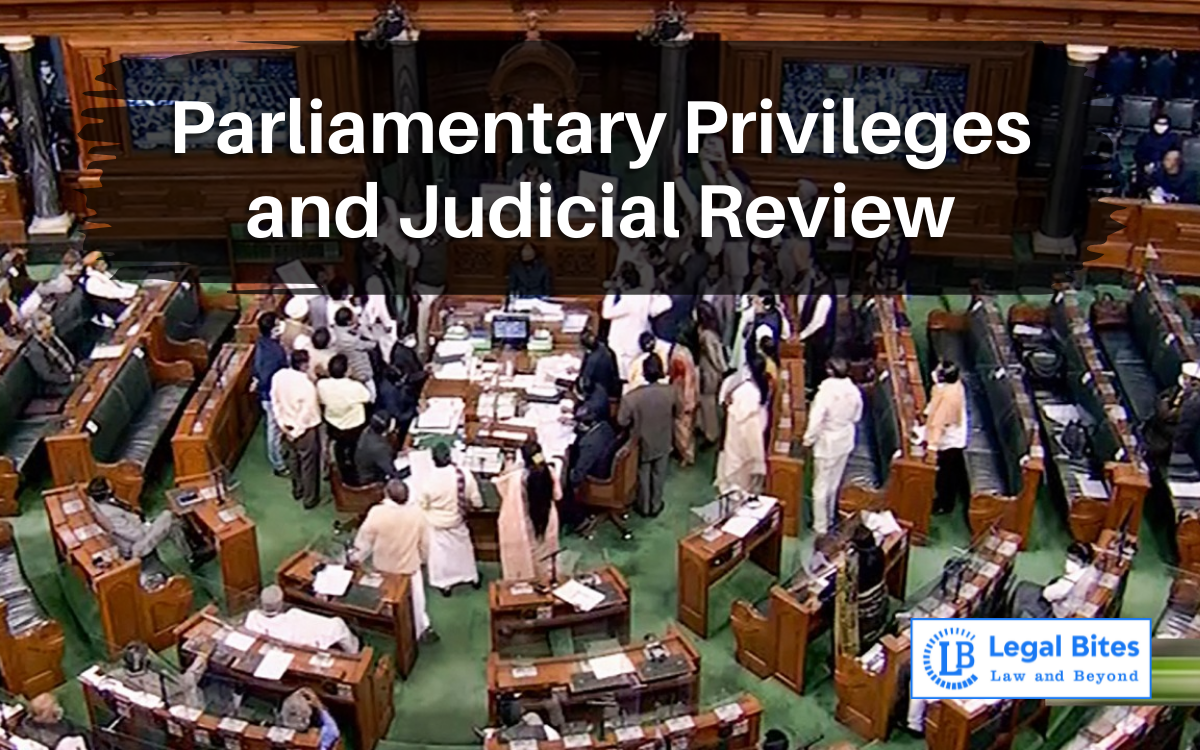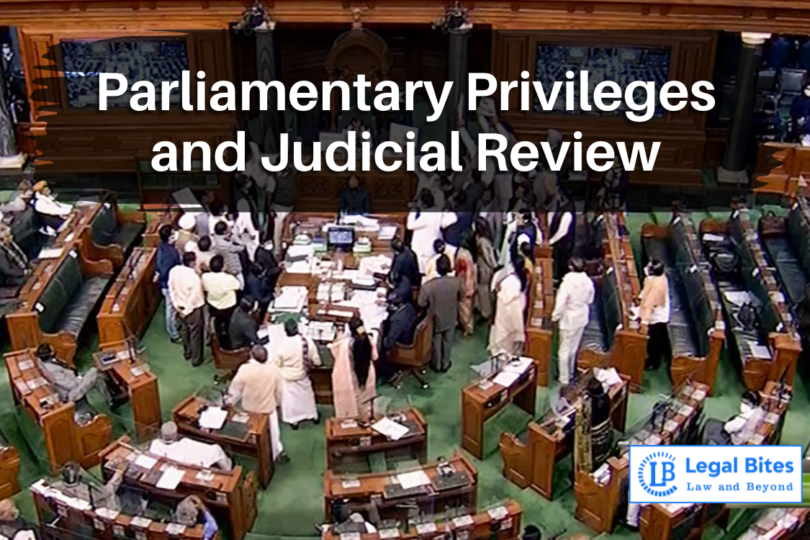
Last Updated on by Admin LB
The article ‘Parliamentary Privileges and Judicial Review’ by Tushar Srivastava and Y. Keerthana Reddy is a brief study of the function of the judiciary through the process of judicial review as well as the privileges of Parliament assigned by the Constitution of India.
Parliamentary Privileges and Judicial Review
The authors have cited case laws in order to explain parliament cannot take advantage of the benefits and if such cases occur the judiciary takes action in the form of judicial review. The objective of the judiciary is just to do justice and the welfare of society. Freedom of Speech, freedom from arrest, etc. are parliamentary privileges.
Introduction: Meaning of Parliamentary Privilege
India, in the case of Raja Ram Pal v. Speaker, Lok Sabha & Ors. on 10 January 2007, defined the term privilege. The term ‘Privilege’ is defined in law as-
immunity or an exemption from a certain duty, burden, attendance, or liability conferred by a special grant in derogation of common right.
The term is derived from the expression ‘privilege’, meaning a law specially passed in favour of or against a particular person. Thus, the term privilege is the special right that is available to different extents and in various forms to the members of parliament throughout the world. These privileges are important in order to enable the house to perform its authorized functions by the constitution and for the proper conduct of business.
Parliamentary privilege is the sum of certain rights enjoyed by each House collectively and by Members of each House individually, without which they could not discharge their functions, and which exceed those possessed by other bodies or individuals.
Members of parliament are granted privileges or benefits under Articles 105 and 194 of the Indian Constitution so that they can carry out their duties and functions without impediment.[1]
Privileges like this are granted because they are necessary for democratic functioning. The law should periodically define these authorities, privileges, and immunities. These privileges are regarded as exceptional provisions, and they have precedence over other provisions in the event of a disagreement.
The privileges of Indian parliamentarians are not comprehensively listed in the Indian constitution. Objectives of parliamentary privilege:
- To enable the house to function effectively.
- To safeguard the integrity of the house.
- To protect and act when the dignity of the House is lowered.
Judicial Review
The judiciary has to take a step on the wrongs committed by the members of the house who are taking the benefit of the privileges. In the case of Keshav Singh v. Speaker, Legislative Assembly[2], the Supreme Court concluded that the privileges bestowed on members are subject to basic rights and that in the event of a dispute, fundamental rights shall prevail.
The Supreme Court further said that any contradiction between privileges and basic rights will be handled via the use of the harmonious methodology. The judiciary is aware enough of the fact that it does not have jurisdiction over parliamentary matters, but the Judicial body should have the power to decide, for the betterment of the community that any offence should be resolved by the court as it is considered fit.
Ansumali Majumdar And Ors. v. State of West Bengal And Anr.[3]
The speaker of the Assembly was granted temporary permission to two communist MLAs to persist in the Assembly boundaries to circumvent arrest under the Prevention Detention Act. According to the court’s observation, general immunity cannot be conferred upon members from arrest.
The Courts have been the guardian of the Constitution and the fundamental rights of the citizen, which were forced to decide the issues, though they were interconnected to the powers, privileges, and immunities of the Parliament and anxious to internal proceedings of the Parliament.
Parliamentary Privileges
1. Freedom of Speech
According to Article 19(a) of the Constitution of India, the Parliamentary members enjoy the freedom of speech and expression. No member gets hold of the task anywhere outside the four walls of the House or cannot even be discriminated against for expressing their views in the House and Committees.
2. Freedom from arrest
In civil cases, 40 days before and after the adjournment of Lok Sabha and Rajya Sabha and when the House is in session, then no member shall be arrested. It also means that no member shall be arrested within the boundaries of the Parliament without the authority of the House to which he/ she belongs.
3. Exemption from attendance as witnesses
Parliamentary members also have an exemption to enjoy freedom from attendance as witnesses.
4. Excluding Strangers’ Right
The members of both the houses have the power as well as right to exclude strangers who are not a member of either of the houses from the proceedings. This is among the most essential right as it safeguards fair and independent discussion in the house and if there is any kind of breach that has been reported then the punishment will be given in the form of reprimand, admonition, or imprisonment.
5. Publishing Debates and Proceedings Rights
According to the rights given to the press to publish the proceedings of the Parliament which parliament itself does not prohibit, technically the House has every such right to prohibit such publication. So, although a member of the Parliament has a Right to Freedom of Speech, he has no right to publish it outside the Parliament and such rules can be held responsible for any liability which is violating the common law rules.
6. The Internal affairs regulation rights of the House
The right to regulate their internal affairs is vested in both Rajya Sabha and Lok Sabha. Under Article 118[4] of the Indian Constitution, the house has been empowered to conduct its regulation of proceedings and cannot be challenged in the court of law on the ground that the house is not in accordance with the rules made under Article 118.
7. Right to Punish members and outsiders for breach of its privileges
In case of any breach or contempt of the House, the Parliament has the power to bring someone to look whether a stranger or any member from either of the House has done contempt of the house. The person is directly expelled from the House if they have committed any breach. This has been defined as a ‘keystone of parliamentary privilege’, the reason is as, without this power, the house will be scorned and breached, which is very necessary to maintain its authority and perform its functions.
References:
[1] Article 105 & 194: Parliamentary & State Legislative Privileges under Indian Constitution, Available Here
[2] AIR 1965 All 349, 1965 CriLJ 170
[3] AIR 1952 Cal 632
[4] Article 118 of the Indian Constitution
